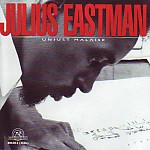A personal note: I met Julius Eastman (1940-1990) only once, in 1980, when a friend and I bumped into him after a concert in New York’s East Village. Although we chatted, and seemingly hit it off, I don’t remember what we talked about. I formed an impression of Eastman as a wound-up, rather opinionated ball of energy whose brilliance I could only take in small, infrequent doses. We promised to keep in touch, and I stupidly did not. Some time later I learned that he was the same Julius Eastman whose over-the-top vocal performance in the first recording of Peter Maxwell Davies’ Eight Songs for a Mad King (Nonesuch) blew me and thousands of other budding student composers away when it came out in the 1970s. At the same time, few of today’s new music fans know anything about Eastman’s standing as a virtuoso pianist and forceful creative presence in New York’s emerging late-’70s/early-’80s “Downtown” scene, a situation that this first commercial release ever of Eastman’s music hopefully will reverse.
Perhaps racism and sexism contributed to the gay African American composer’s lack of acclaim and hastened his downward spiral into alcohol and drug abuse. Yet, as Kyle Gann’s excellent booklet notes point out, Eastman’s combative personality often got in his own way, while his methods of notation were unconventional and frequently difficult to figure out.
For the most part, the works on these three discs, unearthed from archival concert tapes, represent the type of raw, aggressive, urgent strain of repetitive, slow-change music we now identify as minimalism. It has nothing to do with the style’s more refined, domesticated manifestations over the years. To make a comedic analogy, Julius Eastman was to Lenny Bruce as Philip Glass now is to David Letterman. Just as you ease into the catchy repeated riff of Stay On It, you’re immediately confronted by wild, dissonant rejoinders and long sustained notes that are about as welcome as car alarms that won’t turn off. The piece eventually calms down, highlighted by a lyrical, chord-based piano solo toward the end.
If You’re So Smart, Why Aren’t You Rich is a brass-heavy essay where Eastman relentlessly shoves chromatic scales of varying durations and dynamics down your ears and in your face, with moments of aural relief provided by chime strokes. Eastman’s authoritative, secure vocal artistry graces the unaccompanied voice in Prelude to the Holy Presence of Joan D’Arc. An entire 1980 concert is given over to a cycle of three works with four pianos: Evil Nigger, Gay Guerilla, and Crazy Nigger. The massed pianos create angry waves of tremolos, declamatory motives, and harmonic clashes whose gathering resonances and overtones must have created an overwhelming effect in the hall. Certainly Eastman’s “one-two-three-four” count-offs at certain junctures add to the undeniable sense of occasion. Hopefully this release will bring the reputation of one of new music’s most fascinating and troubled figures out of the shadows.
































